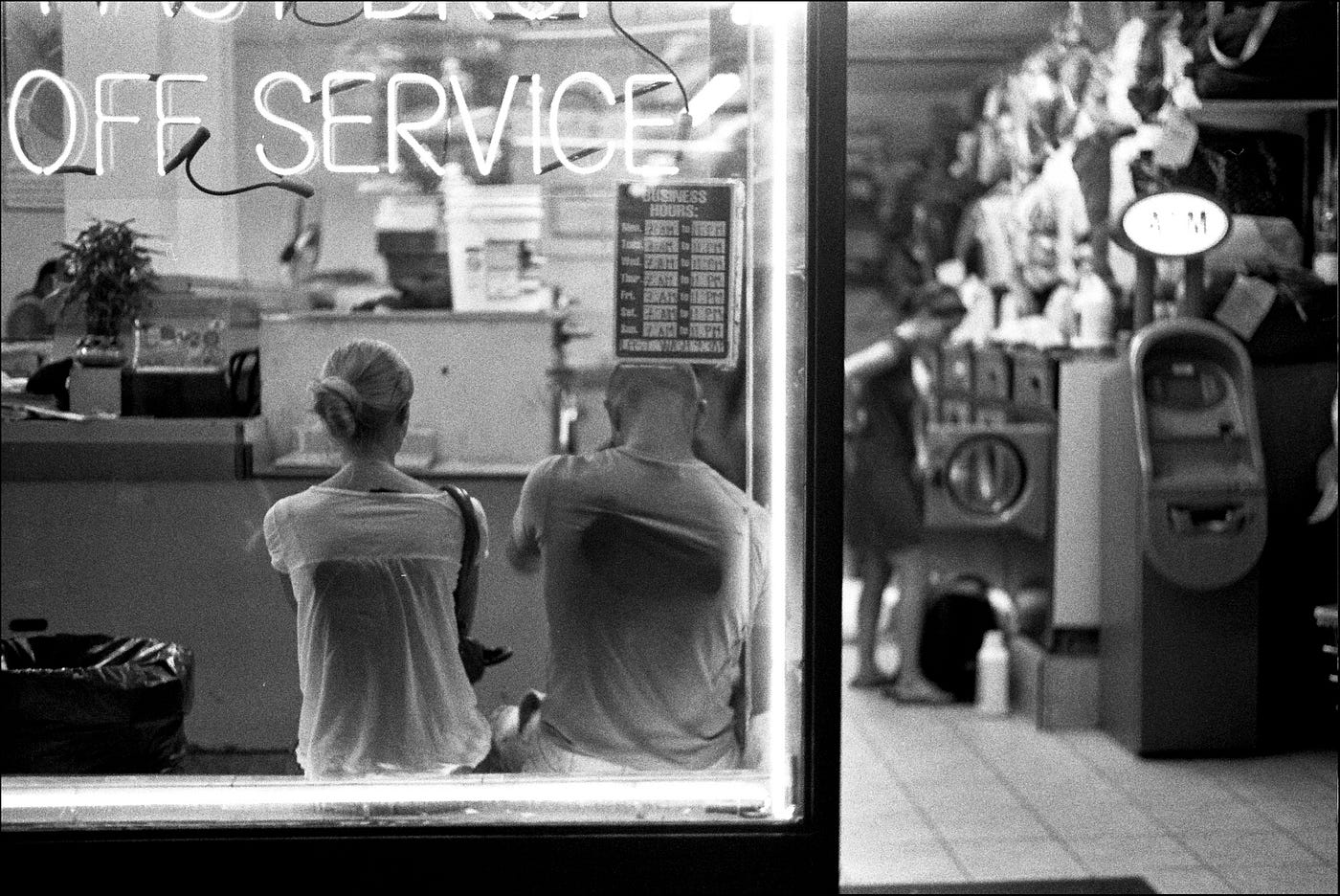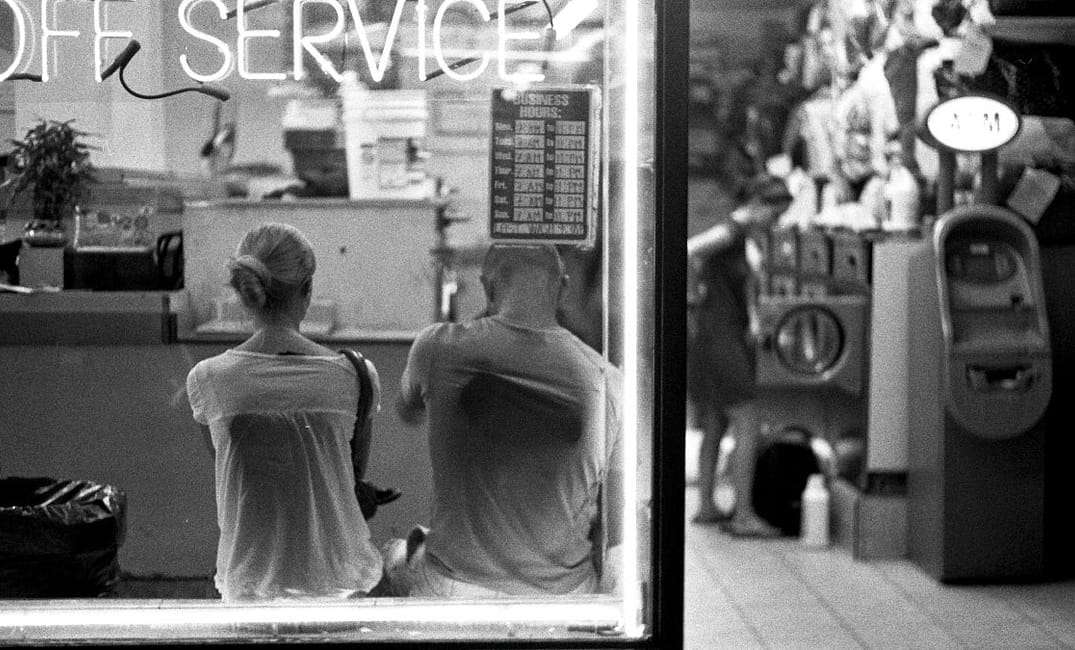
I have a love-hate relationship with my local laundromat. I once tried to explain this conflicting emotion to a guy I matched with on an app. He lived in the suburbs of South San Francisco, with a car, a garage to park it in — and in-unit laundry. I share a four-bedroom, one-bath Victorian apartment with three roommates atop a taqueria in the heart of Haight-Ashbury. My main mode of transportation is a secondhand bike, and I have no way to wash my clothes on site.
Me: Ugh. Jealous. My laundromat is three blocks away from my place. Street kids wash their sleeping bags there.
Him: Isn’t there another one nearby?
Me: Not within walking distance. Shame.
Some days are worse than others, like a sunny Saturday afternoon when local residents come out of the woodwork to wash their laundry at the beginning of a weekend. When the laundromat is near full capacity, I’m forced to use the washer that is unoccupied for a good reason — it has a suspicious thin line of black around the rubber seal. These are the days I must bump shoulders with questionable characters. Huge dogs, panting and drooling, drag their feet behind their owners. If it isn’t BO, it’s alcohol on people’s breath. On the wall of the laundromat are huge letters, “ONLY CLEAN WASHED CLOTHES IN DRYERS,” which makes me wonder: Do people dry unclean clothes?
Sign up for The Bold Italic newsletter to get the best of the Bay Area in your inbox every week.
But there are days when the place is quite deserted—my favorite time to be there. The whirring dryers and water-sloshing washers are my only companions. I have a paperback with me, but it lies limp in my hands as I mindlessly gaze into the dryer across from me, hypnotized by the clothes tossing and turning, round and round in infinite circles. I follow the path of their orbit, sure of where they will end up at every moment. This predictability comforts me, like the ever-present humming of the machines.
I had matched with the in-unit-laundryguy on an app way back when life was not yet disrupted by shelter-in-place orders. We walked along Ocean Beach on our first date. The waning sun cast a golden color on his smooth, tanned face, hidden behind a pair of Ray-Bans. Above the whoosh of cars on the Great Highway and the wind blasting inland, he talked a little too loudly and quickly to cover up any uncomfortable moments of silence. I was conscious of his nearness even as he kept a modest distance from me, his hand sometimes grazing mine. Dinner, drinks, a stroll around the neighborhood. At the end of an unusually warm night, we parted amicably like polite strangers.
I was pleasantly surprised when he asked me out on a second date. I couldn’t fathom why, because despite our friendly date, our conversations weren’t particularly interesting. Regardless, I was flattered by his attention, and over the next couple weeks, we ping-ponged trivial texts.
Him: A co-worker went to Japan and brought back loose-leaf tea. I didn’t have a strainer, so I had a hard time drinking it. I should have drilled holes in my teeth to sieve out the tea leaves.
Me: I mean, what’s another hole or two?
My dry humor masked my true feeling: that his messages puzzled and amused me, a taciturn person by nature. To me, words are often too heavy and cumbersome, things I can’t help but fumble with inside my head and on my lips. His effortless ease with words, feather-light, was enviable. He was fun, and I wanted to be near him, as if his lightness would rub off on me. Perhaps our opposites could balance each other; perhaps we would gradually grow alike.
I wanted him to understand me, and I him, but when that possibility became less and less likely, things ultimately fizzled out between us.
The change machine at the laundromat is a fickle thing. If I’m not careful, it shoots out an angry stream of quarters onto the floor, forcing me to pick them up in a frenzy. Worse yet, sometimes the machine is down, disappointing me in red all-caps letters reading “OUT OF SERVICE.”
Sometime last year, I inserted $3 worth of quarters, only for the washer to fail to start. In disbelief, I repeatedly whacked the top of the machine, waiting to hear the water run. When it held its silence, I reluctantly unloaded the laundry and transferred it to the adjacent machine. After I’d loaded an additional $3 worth of quarters and perched myself, arms crossed, on a stool, I waited for Tom (not his real name), the owner, to appear through the door.
I’ve had quite a few interactions with Tom over the years. He has a slight figure and deep creases carved into his leathery, wizened face. His salt-and-pepper hair pokes out underneath the backward baseball cap that he is forever wearing. Baggy clothes. Dirty, beaten sneakers. It’s as if he’s wearing clothes from his younger days that he has forgotten to wash.
When Tom walked in, I told him what had happened — business first. Otherwise he would go off on a tangent about this and that, because he’s a friendly guy. Too much so for my liking. I usually try to look busy if he is around, intent on reading a book or flipping through Instagram, anything to keep him from talking to me.
Head tilted to one side, Tom looked at the washing machine that ate my money, inserted his own stash of quarters and pressed start. I waited, itching to triumphantly tell him, “I told you so!” But instead, in a fit of cruel irony, the washer began to roar and flood with water.
“I believe you, don’t worry. I’ll give you your money back,” Tom consoled me when I looked at him, open-mouthed, in disbelief.
It was as if they had conspired against me that day — the same machines that used to give me so much solace — by selectively breaking down and making me seem like an incompetent liar. “I didn’t cry wolf, I swear!” I wanted to tell him, but I choked on those words as my emotion overtook my ability to speak. I stormed out into the darkness of the sidewalk, away from the brightly lit spotlight of the laundromat. The washer malfunction was a minor trouble, but it had already been a shitty day — I was over it all.
I was wiping away shameful tears when the laundromat door creaked open. I saw Tom from the corner of my eye but was too embarrassed to look him squarely in the face. In retrospect, I think he was embarrassed too, that he might offend me by saying something too clumsy. Instead, he quietly held out his hand for me to see, holding out roughly $3 worth of quarters. Taken off-guard, I squealed a stifled laugh, finally realizing how silly I was to cry over such a minute nuisance. His silence may have been open to interpretation, but I took it as this: his reassurance that people have bad days sometimes and that it is okay to cry. The quarters jingled lightly as they fell into my palm, and with a weak smile, Tom walked back inside.
I miss the mindless chatter with the guy from the app. He and I used to talk about everything and nothing — our topic of conversation varied greatly about things of little importance, things I could easily joke about and not have to hold close to my heart. Meaningless words aside, I searched for the depth underneath the proverbial iceberg, the possibility that our relationship could have real substance, but when I probed too hard, it shattered into a million pieces. Our relationship wasn’t a mile-deep iceberg. It was a paper-thin sheet of ice on a frozen lake.
Sometimes I regret that I never got around to telling him why it is that I love going to my local laundromat, using the same machines that have washed and dried dirty sleeping bags. But perhaps I was afraid he wouldn’t have understood even if I told him. I don’t know that he would have understood why I would cry over a malfunctioning washer.
Tom and I formed an unspoken understanding after that day. Not that we became chummy all of a sudden. He still talks too much for my liking, and I continue to look busy when he is around except to just say hello. But now I know that behind his tendency to talk (a lot) is his deep, quiet, compassionate self, which I was fortunate to catch a glimpse of that day. In the din of many people and machines, it is hard to know this about Tom.
Another note about Tom: The street kids washing their laundry at the laundromat is proof of his generosity, not his negligence.
As I continue to come to the laundromat week after week, even in times of social distancing, I undoubtedly run into Tom every time. When I do, I always remember the day when he handed me the quarters. I cringe at the memory of my tears, but I also marvel at how he took me by surprise with his silent understanding, as if he knew what I felt without me having to articulate it. This memory encourages me, even in such a hectic time as this, that somebody out there understands me.







